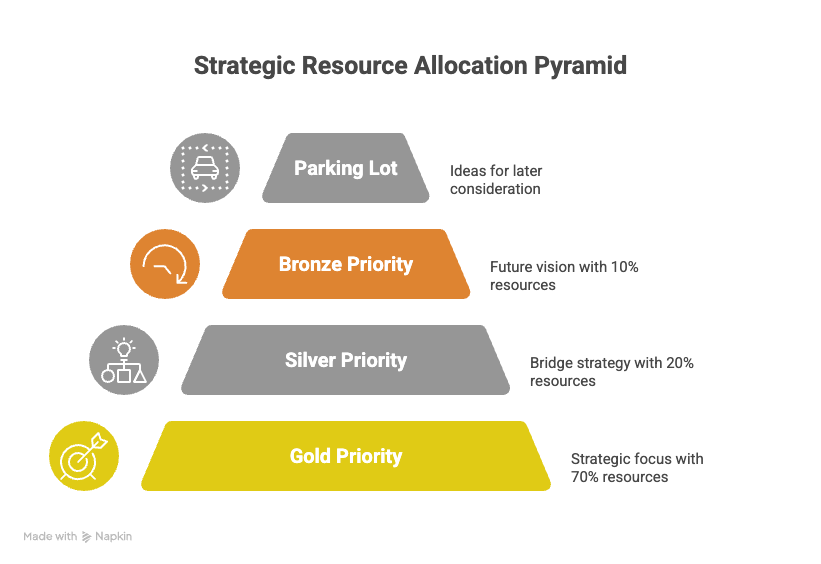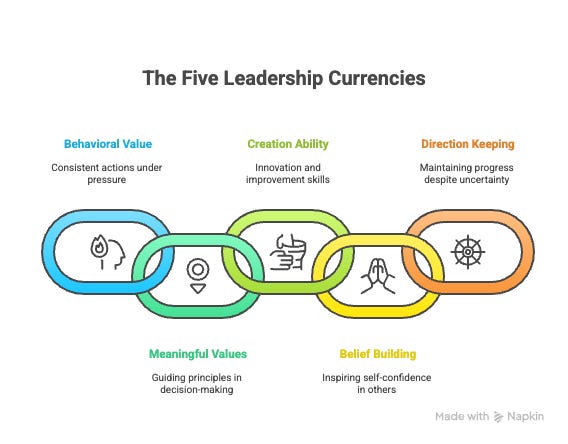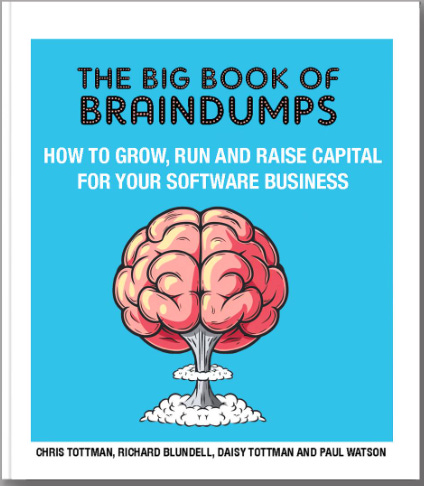How to Lead Like a $1B Venture Capitalist: Chris Tottman on Delegation and Sustainable Growth (Part 2)
The systems that multiply your impact without burning out your team
Thanks for reading! Join leaders worldwide who are future-proofing their leadership with Premium access to exclusive tools, direct guidance, and our leadership community. Discover what you're missing here with a free trial (the next 50 subs. get 50% off for life).
In Part 1, Chris Tottman revealed his frameworks for mastering uncertainty and validation, insights from 500+ investments that work whether you're running a nonprofit, church, or business. But validation is only the beginning.
The leaders who scale sustainably have cracked a different code: how to multiply their impact without doing everything themselves. Chris's "Holiday Exercise" has transformed how hundreds of leaders think about delegation, and his insights on sustainable growth come from watching companies scale from zero to unicorn status, and seeing others flame out spectacularly along the way.
If you missed Part 1, Chris is the Founding GP at Notion Capital ($1B+ AUM), co-founder of the nonprofit organization Included.vc, and co-author of "The Go to Market Handbook for B2B SaaS Leaders." What started as professional curiosity about his insights has evolved into a Substack-born friendship built on multiple conversations about what actually works in leadership.
Here's what he revealed about building systems that run without you, developing authentic leadership presence, and creating growth that lasts.
The Leadership Superpower Hiding in Plain Sight
Most leaders say they want to delegate, but they're actually terrified of losing control.
I see this everywhere, nonprofit directors who "can't find good people," pastors who feel guilty delegating mission work, business owners convinced no one cares as much as they do. The result? Burned-out leaders and underdeveloped teams.
But before we explore delegation systems, Chris revealed the thinking framework that underlies all his leadership approaches, and it explains why his solutions are so unconventional.
Framework #1: Divergent Thinking for Breakthrough Solutions
How dyslexia became a leadership superpower
Chris's Most Personal Revelation:
"Firstly, my dyslexia helps me with imagination as I'm wired as a Divergent thinker, not Convergent. This means I can randomly generate solutions all the time by default. It's a little like being in a flight simulator, and I can plug into a startup with the founder, and all these scenarios play out in my mind that I share. Founders love this as it's wildly different."
The 9 Billion Personality Types Revolution
Later in our conversation, Chris challenged the entire leadership development industry:
"I think there are 9 billion personality types in the world, not 4 or 20 that we read about in psychology or management books. Let's say 10% are Leaders or Managers, so there are almost 1 billion leaders or managers, all with their own unique type. So one has to start accepting that people are different and that is good."
This isn't just feel-good diversity talk. It's strategic thinking. Chris built his investment success by recognizing that breakthrough solutions come from different thinking styles working together.
The Divergent vs. Convergent Framework
"I think it's about being comfortable having different types of people around you. If you're not particularly divergent in your thinking, can you create creative processes or hire a divergent executive to add that to your game? If you are divergent, then you need colleagues to structure information and implement."
Your Strategic Assessment:
If you're divergent: Hire structured implementers to execute your ideas
If you're convergent: Hire creative divergent thinkers to challenge assumptions
Create processes that leverage both thinking styles
This divergent thinking approach shapes everything Chris does, including how he builds teams that can operate without him.
Framework #2: The Complete Resource Allocation System
How the 3 Horizons Model creates ruthless prioritization
When I asked Chris about resource allocation under pressure, he revealed an integrated system that most leaders miss.
The 3 Horizons Strategic Framework
"I also use the 3 Horizons model that I've adapted to startups. It follows a 70%, 20%, 10% framework where 70% of your time & resources focus on executing Horizon 1 (most peoples 'only' strategy). Then, focus 10% on Horizon 3, the long term vision of the industry or what the company is ultimately taking people. This leaves 20% for the bridge between the two, or Horizon 2 - which could be, for example, developing new products for the same customer segment, or taking existing products to new customer segments or markets."
In addition, Chris added that…
"Horizon 2 is where most struggle, to be honest, they get bogged down in horizon 1 or struggle with the tradeoffs when nailing horizon 2."
How This Connects to Ruthless Prioritization
"Ruthless prioritization. People under estimate what they can achieve in the long run BUT over estimate what they can achieve in the short term. The short-term misses can feel crushing vs simply being part of the learning process, to bigger and better things."
"Back to the Prices Law & the Podium analogy - focus on the few things truly matter. Don't dilute your resources across many strategies, actions & campaigns as that like swimming with one arm in butterfly & the other arm in breast stroke. You'll drown in the end."
The Integrated System:
Horizon 1 (70% - Gold Priority): Current execution and core business
Horizon 2 (20% - Silver Priority): Bridge strategies that connect today to tomorrow
Horizon 3 (10% - Bronze Priority): Long-term industry vision and transformation
Everything Else: Goes in the parking lot for later
Why This Works: Most leaders get stuck in Horizon 1 (daily execution) or dream about Horizon 3 (long-term vision) but miss Horizon 2, the bridge that makes transformation possible.
Framework #3: The Holiday Exercise
How forced unavailability reveals delegation gaps
Here's where Chris's approach becomes genuinely radical, at least to me.
"The 'Holiday' exercise is my most successful approach. When I go on holiday, I can't be contacted. That means the team has to be empowered to make decisions and deal with issues without my input or final decision."
The Learning Loop
"When I return, it's either gone really well or really badly, BUT really badly is actually what good looks like. Because really bad tells you that you've not given them the tools or empowered them enough, or they're undertrained in key areas. So you work on that before the next holiday comes around."
The Process:
Go unavailable (no contact during holiday)
Assess results upon return
Identify gaps where the team struggled
Build systems to address those gaps
Repeat until the team is fully empowered
"And when the next holiday arrives, you're not contactable again. You repeat the process until the team is fully empowered, have all the right tools to run the business without you & feel confident with the responsibility because you keep repeating the process."
The Guilt Reframe
"I'd feel guilty that I'm not empowering people, that I'm not challenging them to challenge themselves, not giving them the responsibility, the opportunities to learn & grow, that a lack of belief or trust must exist between us. So if I'm not giving them the keys, then I'm stunting their growth and making them a smaller person in the future and the organization smaller as a consequence."
The Reframe: Delegation isn't about losing control, it's about developing people and multiplying impact. Not delegating is the real leadership failure.
Framework #4: Authentic Leadership Presence
Why cookie-cutter leadership development fails
Chris's Reality Check:
"I think what humans have proven to each other is their inability to work together at relatively small levels of scale. The average company is inherently small & more than 50% of people don't like their boss or company or both."
The Authentic Development Path
"So for those that are new, it's find a model that works for you, your style, your mission, and culture. I have mine. You have yours. Read books, blogs & listen to podcasts. Surround yourself with the people you respect as leaders or managers and create an informal list of mentors. Have regular coffees with them. Be the boss you want to be, NOT what the book says."
The Critical Addition:
"Also learn strategy at the same time, as most things fail because the strategy is wrong, not simply the people."
Key Insight: Focus on developing your authentic leadership style while mastering strategy; most failures are strategic, not personal.
Framework #5: The Sustainable Growth Infinity Loop
What separates unicorns from flame-outs
"I'm ignoring the people for this answer! They're critical and I must say very rare! There is an infinity loop that exists between solving a pain so pressing that the market would desperately adopt a solution if it existed & having a solution so easy to adopt that the speed to value is quick and in some ways amazes the buyer."
The Flywheel Effect
"The flywheel has huge kinetic energy. Word gets out, and word of mouth marketing kicks in, and the whole thing speeds up."
The Two Requirements:
Pain so pressing → market desperately wants a solution
Solution so easy → speed to value amazes buyers
When both exist: Word-of-mouth flywheel creates sustainable, accelerating growth
Framework #6: AI Leadership Revolution
What changes and what stays constant
"Totally, some things never change. Critical thinking. Leadership qualities. Management qualities. Strategic abilities. The ability to execute in peace time or war times."
"We're simply in a new installation period, just like I grew up as a leader in the installation period of the internet in the 90s. We're now growing up in the installation period of AI in all its various forms."
"What did I learn in the 90s and the other eras like SaaS, Mobile, Social that can be applied to Ai? Well, what we're told, sold, or believe to be true mostly won't be true. And some things entirely overlooked will be not only true but huge."
"So be comfortable with all the change, surround yourself with enough people who are all in on AI to learn from, try some tools & set some challenges, or join some communities that are all about the utility of AI and how to use it. Don't be scared of it."
Honestly, the few quotes above were some of my favorites in this interview. Be comfortable with change…
Framework #7: The Long Game Currency
What will matter most in the next decade
"Play the long game. The biggest currency you can have as leaders will come from the following pool of assets: The value of your behaviours, Your values meaning something, Your ability to create something out of nothing or more than something already is, The ability for people to believe in you and believe in themselves just as much, Your ability to keep moving the team forward, in the right direction of travel, even when the direction appears lost."
The Five Leadership Currencies
Behavioral Value → How you consistently act under pressure
Meaningful Values → Principles that guide decisions, not just wall posters
Creation Ability → Making something from nothing or improving what exists
Belief Building → Helping others believe in themselves as much as in you
Direction Keeping → Moving forward even when the path is unclear
The Book That Bridges Venture Capital and Everyday Leadership
While Chris, Richard Blundell, and Paul Watson's first book focused specifically on B2B SaaS, their new book, 'The Big Book of Brain Dumps,' JUST RELEASED, takes these battle-tested frameworks and makes them applicable to any leader navigating uncertainty and growth.
Check it out!
If You Only Remember This:
Embrace your thinking style: Build teams that complement divergent and convergent thinking
Use the 3 Horizons Model: 70% current execution, 20% bridge strategies, 10% future vision
Implement the Holiday Exercise: Force unavailability to reveal delegation gaps, then build systems
Reframe delegation guilt: Not delegating stunts team growth and organizational capacity
Build the infinity loop: Pain so pressing + solution so easy = sustainable word-of-mouth growth
Play the long game: Your behaviors, values, creation ability, belief building, and direction keeping are your true leadership currency
These frameworks work whether you're leading a startup, nonprofit, or Fortune 500 company. The question isn't whether change is coming, it's whether you'll lead through it with systems that multiply your impact.
Start with the Holiday Exercise this month. Design your unavailability test, document what breaks, and build the systems that turn those failures into your team's greatest strengths.
Which framework will you implement first?
PS: Many subscribers get their Premium membership reimbursed through their company’s professional development $. Use this template to request yours.
Let’s Connect
I love connecting with people. Please use the following to connect, collaborate, if you have an idea, or just want to engage further:
LinkedIn / Community Chat / Email / Medium









It's been such a brilliant experience being interviewed by Joel ✨ I seriously recommend it - he is so talented not just as an interviewer but how he takes the raw material and turns it into genuinely valuable & actionable content for people to take onboard and run with 🧡
Priceless frameworks, Chris - I especially like the "Holiday" framework to build a self-sustaining company. What struck me was the lack of judgment around the results when you return.
Regardless how things worked out, you review, adjust, iterate, and leap into action and go back on vacation. Rinse & repeat!